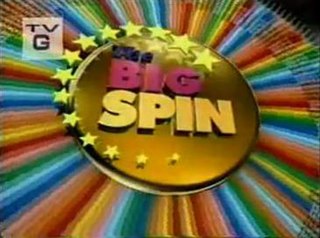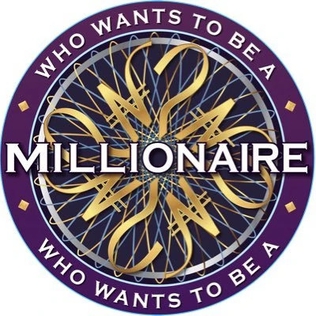
The Weakest Link is a British television quiz show, mainly broadcast on BBC Two and BBC One. It was devised by Fintan Coyle and Cathy Dunning and developed for television by the BBC Entertainment Department. The game begins with a team of nine contestants, who take turns answering general knowledge questions within a time limit to create chains of nine correct answers in a row. At the end of each round, the players then vote one contestant, "the weakest link", out of the game. After two players are left, they play in a head-to-head penalty shootout format, with five questions asked to each contestant in turn, to determine the winner.
Who Wants to Be a Millionaire? is an international television game show franchise of British origin, created by David Briggs, Mike Whitehill and Steven Knight. In its format, currently owned and licensed by Sony Pictures Television, contestants tackle a series of multiple-choice questions to win large cash prizes in a format that twists on many game show genre conventions – only one contestant plays at a time, similar to radio quizzes; contestants are given the question before deciding whether to answer, and have no time limit to answer questions; and the amount offered increases as they tackle questions that become increasingly difficult. The maximum cash prize offered in most versions of the format is an aspirational value in local currency, such as £1 million in the UK or ₹75 million in India.

Christopher John Tarrant, is an English broadcaster, television personality and former radio DJ. He presented the ITV children's television show Tiswas from 1974 to 1981, and the game show Who Wants to Be a Millionaire? from 1998 to 2014. He was a Capital Radio host from 1984 to 2004. Tarrant received an OBE in 2004 for his charity work, in particular his campaigning on behalf of disadvantaged children.

Charles William Ingram is an English fraudster, novelist and former British Army major who gained fame for his appearance on the ITV television game show Who Wants to Be a Millionaire? In episodes recorded in September 2001, Ingram correctly answered fifteen questions to win the show's maximum prize of £1 million, becoming the third recorded contestant to ever do so. However, he was denied the winnings due to suspicion of cheating.

Who Wants to Be a Millionaire – Play It! was a game show taping mock-up at Disney's Hollywood Studios theme park at Walt Disney World Resort in Orlando, Florida, and Disney California Adventure at Disneyland Resort in Anaheim, California. The attraction was a modified version of the Who Wants to Be a Millionaire television game show.

Deal or No Deal is an Australian game show that originally aired on the Seven Network from 13 July 2003 to 4 October 2013. It was the first international version of the game show, after the original Miljoenenjacht from the Netherlands. It was the first of the versions to use the Deal or No Deal name. It was hosted by Andrew O'Keefe for its initial 10-year run.

Who Wants to Be a Millionaire? is a British television quiz show, created by David Briggs, Steven Knight and Mike Whitehill for the ITV network. The programme's format has contestants taking on multiple-choice questions based upon general knowledge, winning a cash prize for each question they answer correctly, with the amount offered increasing as they take on more difficult questions. If an incorrect answer is given, the contestant will leave with whatever cash prize is guaranteed by the last safety net they have passed, unless they opt to walk away before answering the next question with the money they had managed to reach. To assist in the quiz, contestants are given a series of "lifelines" to help answer questions.

Who Wants to Be a Millionaire is an American television game show based on the format of the same-titled British program created by David Briggs, Steven Knight and Mike Whitehill and developed in the United States by Michael Davies. The show features a quiz competition with contestants attempting to win a top prize of $1,000,000 by answering a series of multiple-choice questions, usually of increasing difficulty. The program has endured as one of the longest-running and most successful international variants in the Who Wants to Be a Millionaire? franchise.

The Big Spin is the California Lottery's first television game show.
The People Versus is a British game show that aired on ITV from 13 August 2000 to 18 June 2002. Series 1 was hosted by Kirsty Young and Series 2 by Kaye Adams. The central format was that the questions were sent in by the viewers.
The Weakest Link is an Australian game show based on the UK format, which aired from 5 February 2001 until 22 April 2002 and was originally broadcast on the Seven Network. Presented by Cornelia Frances, the show featured nine contestants competing for a potential prize of $100,000. Airing twice weekly in primetime, on Mondays and Thursdays or Fridays, it received modest ratings until its cancellation in April 2002. The show was produced in the Seven Network's South Melbourne headquarters.

Who Wants to Be a Millionaire? is an Australian television game show which would offer a maximum cash prize of $1,000,000 for answering 15 successive multiple-choice questions of increasing difficulty. The show was based on and follows the same general format of the original version of the show from the United Kingdom, and is part of the international Who Wants to Be a Millionaire? franchise.

Who Wants to Be a Millionaire? New Zealand was a New Zealand game show based on the original British format of Who Wants to Be a Millionaire?. The show was hosted by Mike Hosking. The main goal of the game was to win one million New Zealand dollars by answering 15 multiple-choice questions correctly. There were four "lifelines". It was broadcast on the TVNZ station TV ONE. The show was taped in Melbourne, Australia on the set of the Australian version of the show.

Who Wants to Be a Millionaire? is a Nigerian game show based on the original British format of Who Wants to Be a Millionaire?. It first aired on 8 October 2004 and stopped temporarily on 25 June 2017. On 29 August 2017, a deal was secured with Airoplaycare behind the new sponsor after MTN Nigeria pulled out from the game show.

Who Wants to Be a Millionaire? is a Philippine television game show broadcast by IBC and TV5. The show is based on the British game show on the same name. It premiered on November 13, 2000 on IBC and concluded on December 14, 2002. The show returned on May 23, 2009 on TV5, hosted by Vic Sotto. It ended on November 22, 2015.

Un, dos, tres... responda otra vez, usually shortened as Un, dos, tres..., and named Un, dos, tres... a leer esta vez in its last season, was a Spanish prime-time television game show, created by Narciso Ibáñez Serrador, which was broadcast on La Primera Cadena of Televisión Española for ten seasons from 1972 to 2004.
¿Quién Quiere ser Millonario? was a Venezuelan game show based on the British format of Who Wants to Be a Millionaire?. The show offered large cash prizes for correctly answering a series of randomized multiple-choice questions of varying difficulties. It was hosted by Eladio Lárez, and broadcast from the Teatro La Campina.

Monopoly Millionaires' Club (MMC) was a series of 16 scratchcard games that differed by its participating lotteries; its players could become eligible to be flown to Las Vegas to take part in an episode of the Monopoly Millionaires′ Club game show
R v Ingram, C., Ingram, D. and Whittock, T. was a 2003 English Crown Court fraud case in which Major Charles Ingram, his wife Diana and college lecturer Tecwen Whittock were found guilty of procuring the execution of a valuable security by deception—obtaining a signed cheque for £1 million—by cheating on the filming of the UK game show Who Wants to Be a Millionaire? The charge was that Charles Ingram used coughs by his wife and Whittock to guide him to the correct answers, in order to win £1 million in violation of the rules of the game. The Ingrams were sentenced to an 18-month suspended sentence and Whittock to one of 12 months. The three also received fines and were ordered to pay costs.

Ko Banchha Crorepati is a Nepali television game show based on the British program Who Wants to Be a Millionaire?.














